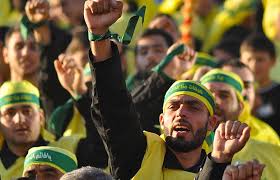March 2016
Why has Iran become terrified of the Lebanese Hezbollah being blacklisted
as a terrorist organization? Even a quick glance at the reactions and remarks
made by senior Iranian regime officials can provide us an answer to the
political and military definition of this blacklisting.
The Gulf Cooperation Council held a session in Tunisia where they
enlisted the Lebanese Hezbollah as a terrorist entity. Consequently, the
Council of Interior Ministers of a large number of Arabic countries gathering
in Tunisia officially placed Hezbollah in their terrorist list. The two
countries of Iraq and Lebanon did not vote to this bill. Iraqi Interior
Minister Ghaban, a known member of the terrorist 9th Badr
Organization, left the session in protest, knowing Iraqi militia groups are
next in line to also be blacklisted.
To understand the importance of this subject from Iran’s perspective I
raise your attention to two pieces published in the Iranian regime’s media:
State-run Balagh website (March 2, 2016): “We would not be
exaggerating to say Hezbollah is responsible for the ground operations in
Russia’s military strategy in Syria, al-Akhbar wrote. Therefore, if Hezbollah
is described as a terrorist organization and attacks are carried out against
this entity, it will be considered as an attack against the Syrian army and
Russia.”
State-run Khedmat website (March 2, 2016): “Saudi Arabia and other
Arabic countries, who have severed their ties with Iran in January, intend to
place Hezbollah in the list of terrorist organizations in an attempt to further
confront Iran and weaken their measures in Syria.”
Firstly, the Iranian regime knows quite well that the political stance
of Saudi Arabia and other Arab countries must be taken seriously, and they have
done so.
“This decision has been made to confront Iran’s project in the region.
There has been much delay in this decision and Saudi Arabia must have
blacklisted Hezbollah back in 2013 when the list was first published,” a
leading Arab analyst said. (Jamal Ghashoghchi – Al Jazeera TV – March 2, 2016)
Secondly, it is quite obvious and there is no doubt that this action
taken by Arab states is actually against the masters of Hezbollah, being none
other than Iran. Even the regime’s own media outlets have admitted to this
reality.
It is clear that when Hezbollah is attacked and blacklisted, Iran,
being it’s Godfather, is also blasted and reacts in response. There is nothing
new in this. However, the question is what is behind all this reaction to this
new development.
Iran is attempting to depict an image as if Hezbollah is part of the
strategy of Russia’s presence in Syria, and they are pursuing a united war in
this regard: the air force being provided by Russia and Hezbollah being the
ground forces! However, the facts on the ground is different, something Iran is
attempting to cloak; first of all, Hezbollah is actually part of Iran’s
strategy in Syria, with their forces and Iran’s Revolutionary Guards (IRGC)
fighting shoulder to shoulder in Syria. If Hezbollah is targeted, the IRGC is
targeted. Secondly, while entering the scene in Syria’s war, Russia is seeking
completely different objectives and interests in Syria. Russia has only entered
the Syria war to obtain incentives in other areas, and it would be quite natural
if it saw the consequences becoming too serious, placing it in a face-off
against Arab states – considering the major interests it has with these
countries – Moscow would not be willing to sacrifice these interests for a war
with no end in sight. This is exactly why Russia entered joint peace talks with
the United States; any such peace has created much tension for the Iranian
regime, describing it as an “American peace.” If Russia has entered a political
process (which it has), and based on normal political calculations, it will
seek to continue this trend to the very end. If Moscow decides to stand its
position and enter a conflict with coalition forces, there will be no prospect
in the logical military balance of power, leaving it defeated and crushed. If
it decides to withdraw, the meaning is obvious. Therefore, the Iranian regime
has no future in Syria other than defeat. Such a defeat will quickly lead into
its own apparatus.

No comments:
Post a Comment